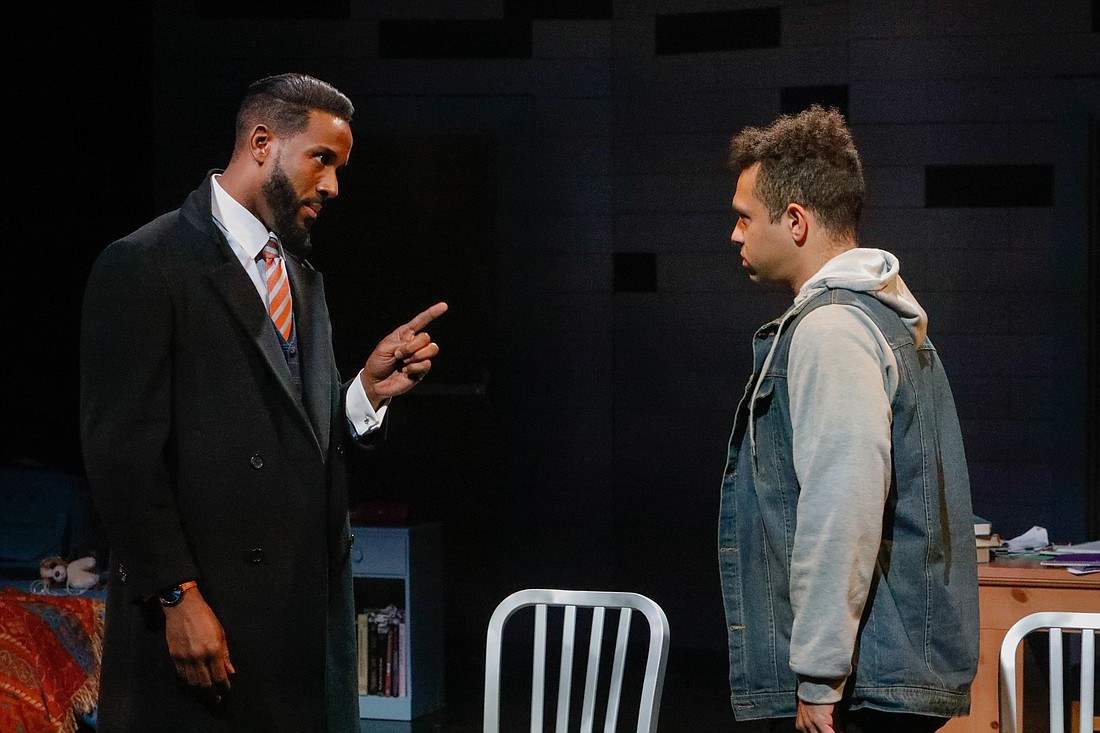- May 22, 2025
-
-
Loading

Loading

Dominique Morisseau’s “Pipeline” is timely. (It’s a damn shame, but it’s a fact.) The “Pipeline” of the play’s title refers to the school-to-prison “pipeline” for African-American teenagers. For Black youth, an outburst of adolescent anger can be a “Go Directly to Jail” card in the Monopoly game of life.
Nya (Renata Eastlick) knows this pipeline all too well. She’s a recently divorced single mother who teaches in a public high school in the inner city. She sees outbursts of violence every day — and knows that a few seconds of rage can translate to a life behind bars. To spare her son Omari (Donovan Whitney) this fate, Nya and her ex-husband Xavier (Joel PE King) sent him to a private boarding school. But Omari has a temper — and just slammed a white teacher into a smartboard over a perceived racist slur. It’s Omari’s third strike. At best, the school will expel him. At worst, he’s on the prison pipeline. As the play opens, Nya’s circling the vortex of a panic attack after hearing this bad news. When Omari runs away, she gets pulled in.
Why is Omari such an angry young man? A lesser playwright would offer a buzzword equation. White privilege + systemic racism = Black rage. Morisseau doesn’t. Her play doesn’t even define “pipeline.” You either know it, or you get it.
Morisseau’s characters feel like real people. But they’re larger-than-life — and burn far brighter. It’s the difference between a flashlight and a laser beam.
L. Peter Callender’s direction honors the playwright’s hyper-reality. His approach to dialogue and physicalization seem natural, never stagey. But he doesn’t shy away from the white-hot intensity of the play’s brightest and darkest moments. When it’s time to go big, he doesn’t play it small. The actors don’t, either.
Eastlick’s Nya is a powerful woman — more importantly, she’s real. Eastlick avoids the tropes of the saintly single mother. Her Nya is flesh-and-blood. She feels and she bleeds. Whitney’s characterization of Omari also defies cliché. He’s an angry young Black man. His sense that others have reduced him to that stereotype explains much of his anger. Emerald Rose Sullivan is great as Jasmine, Omari’s fiery, fearless, eloquent girlfriend.
King is understated and wounded as Xavier, Omari’s father and Nya’s ex. Xavier pays for his offspring’s boarding school — but his bond with his son is broken. King is heartbreaking in the scene where Omari declares his hatred and total rejection of his father. Xavier walks away — and he might not come back. Emilia Sargent is a spitfire as Laurie, Nya’s friend and fellow teacher. Her character has just returned to school after a bit of reconstructive surgery (an angry parent slashed her face). Laurie’s outer scar can be repaired. Her inner scar? Maybe not. Isaac Esau Gay is also affecting as Dun, the school’s overworked security officer. The man does his best, but he can only be in one place at a time. The students’ rage is everywhere.
It all adds up to an incandescent script and unforgettable characters. It’s powerful on stage, and isn’t lost in translation to streaming video.
Bill Wagy understands the logic (and magic) of film. What you’ll see is a three-camera video, edited from two live performances. Starting with this footage, Wagy created a subtle editing rhythm from different camera angles. It’s a record of a stage performance, but it’s also a movie, and it works on those terms. Nicely done.
Kudos also to Adrienne Pitts’ true-to-life costumes and Adam Spencer’s stark set design for conveying this world’s unforgiving exterior reality. Patrick Russini’s soundscape, Jay Poppe’s video projections, and Alex Pinchin and Joseph Oshry’s lighting pull you into the characters’ interior lives. Their alchemy transmutes their stream-of-consciousness to sight and sound.
Now let’s get back to the playwright. She defies expectations, and I want to make sure you don’t have any before experiencing her work.
Morisseau is a master of language. Her play delivers several hypnotic soliloquies — disguised as long cell phone messages or angry monologs. Words matter in her play, and she frames the action as a counterpoint between two works of literature: Gwendolyn Brooks’ poem, “We Real Cool” and Richard Wright’s novel, “Native Son.” The poem is an incantatory ode to hopelessness: a prophecy of death for young Black males, and Nya’s greatest fear. Wright’s novel revolves around the fear, loathing and killings of a 20-something Black man named Bigger Thomas. Omari’s white teacher repeatedly asks him if he can relate to the character’s “animalistic rage.” Omari asks the teacher to drop it. The teacher doesn’t, and gets an answer he wasn’t ready for. As to the playwright …
She refuses to give you the answer.
“Pipeline” is a political play, but not a polemic. Morisseau lets you think for yourself and doesn’t do your homework for you. Her strategy is empathy. The playwright gets you inside the characters’ skins. But she goes for the head as well as the heart. She raises challenging issues, but that’s a side-effect. “Pipeline” begins and ends with character. Morisseau’s people are complicated, messy and full of contradictions. They’re all-too-human, and living in a world that’s blind to their humanity. Our future depends on that perception. And it’s not always easy …
At the play’s end, Omari offers his mother a 10-point checklist to help Nya see his humanity. The 10th commandment is missing. Why? He’s still working on it …
In the end, there’s no final answer.
The playwright leaves it up to you to fill in the blank.
Playwright Dominique Morisseau will speak at a WBTT Voices community forum on May 4 at 6 p.m. This live Zoom video is free, but registration is required at the theater’s website.